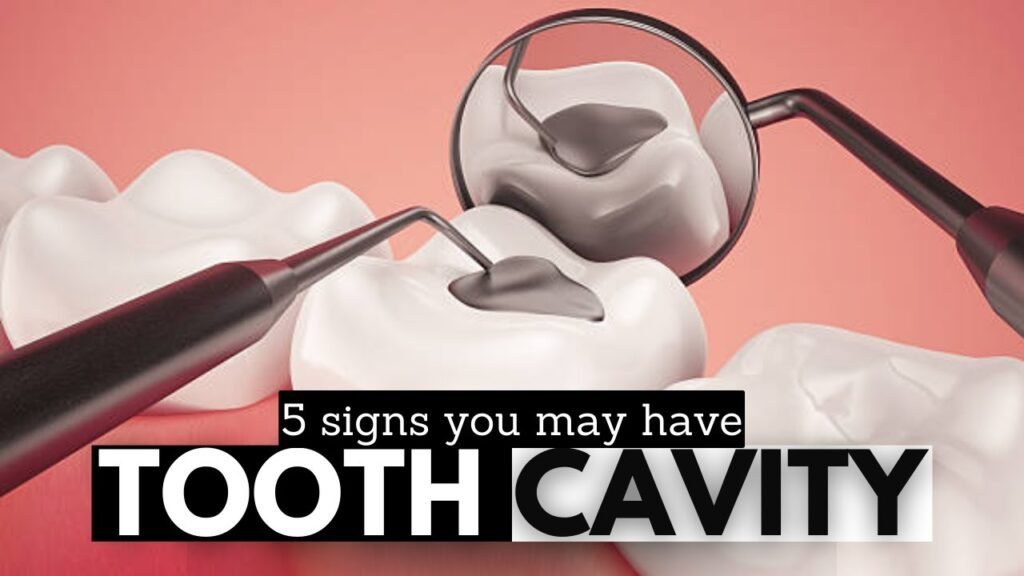5 Telltale Signs You Have a Cavity

Cavities can be a real pain – literally! If you're experiencing tooth sensitivity, pain when biting down, or visible holes in your teeth, you may have a cavity. Don't ignore these signs – read on to learn more about the symptoms and treatment options for cavities.
Is it possible for a cavity to heal on its own?
Unfortunately, a cavity cannot go away on its own once it has progressed beyond the early stages. The decay needs to be removed and the affected tooth restored by a dentist to prevent further damage and pain. Ignoring a cavity can lead to more serious dental issues down the line.
If you notice any signs of a cavity, such as tooth sensitivity or pain when biting down, it's important to seek treatment promptly. A dentist can provide the necessary treatment to stop the decay and restore the tooth to its proper function. Early intervention is key to preventing the cavity from worsening and causing more extensive damage.
Regular dental check-ups and good oral hygiene habits, such as brushing and flossing daily, can help prevent cavities from forming in the first place. However, if a cavity does develop, it's essential to seek professional treatment to prevent further complications and maintain optimal oral health.
What is the sensation experienced at the beginning of a cavity?
The start of a cavity might not feel like much at all - you could have mild or no pain, making it difficult to notice. However, if left untreated, the cavity can progress to the point where you experience a constant, severe toothache. This pain can occur regardless of whether you're eating, talking, or simply at rest, making it important to address any initial signs of tooth decay promptly.
What is a Stage 1 early cavity?
A Stage 1 early cavity is typically painless and can be identified by a dentist or dental hygienist during a regular check-up. These cavities appear as small gray spots or areas of enamel erosion, and do not cause discomfort as they have not yet reached the nerve-filled dentin layer. Regular dental visits can help catch these cavities early and prevent further damage to the tooth.
Spotting the Silent Enemy: Signs of Cavities
Cavities, also known as tooth decay, can often go unnoticed until it's too late. However, there are subtle signs that can help you spot this silent enemy early on. Keep an eye out for tooth sensitivity to hot or cold, pain when biting down, visible holes or pits in your teeth, and dark spots or staining. Regular dental check-ups and good oral hygiene habits are key in preventing cavities and maintaining a healthy smile. Don't ignore these warning signs, as catching cavities early can save you from more extensive dental procedures down the road. Spotting the silent enemy before it wreaks havoc on your teeth is crucial for maintaining optimal oral health.
Don't Ignore the Warning Signs of Tooth Decay
Are you experiencing tooth sensitivity, pain when biting down, or visible cavities? These could be warning signs of tooth decay that should not be ignored. Ignoring these symptoms can lead to more serious dental issues down the line, such as infections or even tooth loss. It is important to address any signs of tooth decay promptly to prevent further damage and maintain good oral health.
Regular dental check-ups and proper oral hygiene are essential in preventing tooth decay. Brushing your teeth twice a day, flossing daily, and using mouthwash can help remove plaque and bacteria that cause decay. In addition, a balanced diet low in sugary and acidic foods can also contribute to healthier teeth and gums. By staying proactive in your oral care routine, you can reduce your risk of developing cavities and other dental problems.
If you notice any warning signs of tooth decay, such as persistent toothaches or sensitivity, don't hesitate to schedule an appointment with your dentist. Early detection and treatment of decay can prevent the need for more extensive and costly procedures in the future. Remember, your oral health is important, so don't ignore the signs that your teeth are giving you.
Remember, early detection of cavities is key to preventing further damage to your teeth. If you notice any of these signs, such as tooth sensitivity, pain when biting down, or visible holes in your teeth, make sure to schedule an appointment with your dentist as soon as possible. Taking care of your oral health now can save you from more serious issues down the line. Don't ignore the warning signs – your smile will thank you in the long run.